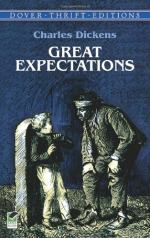And Joe got in beside me, and we drove away together into the country, where the rich summer growth was already on the trees and on the grass, and sweet summer scents filled all the air. The day happened to be Sunday, and when I looked on the loveliness around me, and thought how it had grown and changed, and how the little wild flowers had been forming, and the voices of the birds had been strengthening, by day and by night, under the sun and under the stars, while poor I lay burning and tossing on my bed, the mere remembrance of having burned and tossed there, came like a check upon my peace. But, when I heard the Sunday bells, and looked around a little more upon the outspread beauty, I felt that I was not nearly thankful enough — that I was too weak yet, to be even that — and I laid my head on Joe’s shoulder, as I had laid it long ago when he had taken me to the Fair or where not, and it was too much for my young senses.
More composure came to me after a while, and we talked as we used to talk, lying on the grass at the old Battery. There was no change whatever in Joe. Exactly what he had been in my eyes then, he was in my eyes still; just as simply faithful, and as simply right.
When we got back again and he lifted me out, and carried me — so easily — across the court and up the stairs, I thought of that eventful Christmas Day when he had carried me over the marshes. We had not yet made any allusion to my change of fortune, nor did I know how much of my late history he was acquainted with. I was so doubtful of myself now, and put so much trust in him, that I could not satisfy myself whether I ought to refer to it when he did not.
“Have you heard, Joe,” I asked him that evening, upon further consideration, as he smoked his pipe at the window, “who my patron was?”
“I heerd,” returned Joe, “as it were not Miss Havisham, old chap.”
“Did you hear who it was, Joe?”
“Well! I heerd as it were a person what sent the person what giv’ you the bank-notes at the Jolly Bargemen, Pip.”
“So it was.”
“Astonishing!” said Joe, in the placidest way.
“Did you hear that he was dead, Joe?” I presently asked, with increasing diffidence.
“Which? Him as sent the bank-notes, Pip?”
“Yes.”
“I think,” said Joe, after meditating a long time, and looking rather evasively at the window-seat, “as I did hear tell that how he were something or another in a general way in that direction.”
“Did you hear anything of his circumstances, Joe?”
“Not partickler, Pip.”
“If you would like to hear, Joe—” I was beginning, when Joe got up and came to my sofa.
“Lookee here, old chap,” said Joe, bending over me. “Ever the best of friends; ain’t us, Pip?”
I was ashamed to answer him.
“Wery good, then,” said Joe, as if I had answered; “that’s all right, that’s agreed upon. Then why go into subjects, old chap, which as betwixt two sech must be for ever onnecessary? There’s subjects enough as betwixt two sech, without onnecessary ones. Lord! To think of your poor sister and her Rampages! And don’t you remember Tickler?”




